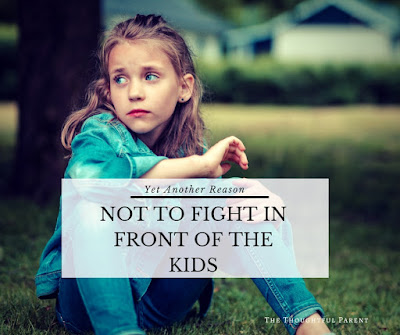We’ve all done it…that argument with our spouse/partner just exploded in front of our kids. It may not have even been a big argument. Maybe it’s that argument that you’ve had with your spouse about 100 times and never gets resolved. You know it’s really not a relationship-threatening argument, but your child doesn’t. They see people they love arguing and they worry, perhaps ruminate about it.
As children ourselves, many of us probably experienced this too. How did it make you feel?
Research is now showing how arguing in front of kids can affect them at different levels. This is not meant to shame parents, but rather just to make us all aware of how things are seen from the perspective of a child.

New research from the University of Rochester, Syracuse University and University of Notre Dame is showing that parental conflict may affect how children perform in school. One recent study followed 216 6-year-olds over a period of three years. The children’s teachers were asked about the kids’ behavior at school such as interaction with peers, participation in classroom activities, and following teacher’s instructions. As part of the study, the children were also asked about their worries and thoughts about how their parents got along. Here are the major results:
– children who reported more negative thoughts/worries about their parents getting along had more attention problems
– children with more attention problems were more likely to have more problems in school (as reported by teachers) the same year and one year later
– the authors report that many of the children’s worries were based on witnessing their parents’ relationship problems
So what does this really mean? Well, it seems that kids who witness their parents’ disagreements on a regular basis are, not surprisingly, troubled by this conflict. They worry and think about these conflicts as a way of coping. While this worry may serve to help them cope, it also seems that it may make it hard for them to concentrate on school-related tasks.
This also relates well to another study I wrote about concerning children’s understanding of emotions and their attention process. Much like this study, it showed that kids who understand emotions better, have fewer problems paying attention. In other words, if they understand the emotional world around them, this frees up their brain to focus on school tasks more completely.
Related reading: The Emotional World Behind Kids’ Attention Problems
It turns out that the emotional world of kids plays a pretty big role in their attention process too.
I found this study interesting because although we all know that parental conflict isn’t good for kids, this study examined why and how this is the case. It’s not just seeing the conflict that is harmful, but it causes kids to worry so much that it interferes with their ability to concentrate on school. Kids are people too! We find it hard to concentrate on work when we’re upset about something and they do too.
Perfect for Pinning:


Stacey Keller Thompson
thanks, I really needed to see this. We don't fight too often, but when we do disagree, it is hard to remember that little ears and eyes are watching and learning.
Thanks for your blog. If you're interested, you might like my blog too: findingthejoyinmotherhood.blogspot.com
Krissi
Thanks for the tip. I have a toddler and 3 month old twins…sometimes tempers flare and I can see that my daughter is developing an attitude! (Well I suppose she is going through some terribe 2's too.) Anway, glad I found you! Following from MBC!